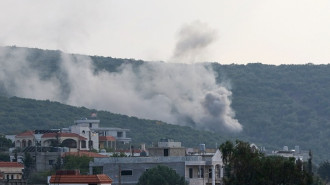Hariri accuses Lebanon's Hizballah of regional interference
Hariri issued a statement, Saturday, saying he would not tolerate Hizballah taking actions that might "affect our Arab brothers or target the security and stability of their countries".
He did not reveal which countries he meant, but Hizballah are backing Bashar al-Assad's forces in Syria and aiding the Iraqi army and militias.
Saudi Arabia has also accused Hizballah of supporting Yemeni Houthi militants who fired a ballistic missile at the capital Riyadh earlier this month.
Earlier this week, Hizballah leader Hassan Nasrallah confirmed his fighters were engaged in fighting in Iraq and Syria but promised they would withdraw.
Iran's growing influence in the region has been of concern for Saudi Arabia and other Gulf states.
Many analysts believe Hariri's resignation - which coincided with the firing of the Houthi missile - was due to Saudi influence.
During his surprise resignation speech - which was made from Riyadh - Hariri said the decision to quit was based on Hizballah's growing influence in Lebanon and threats to his life.
After stopovers in France, Egypt and Cyprus, Hariri arrived home to Beirut late Tuesday and put his resignation notice on hold.
On Saturday, he said the decision was based on giving the Lebanese leadership time to look into a demand that the country follows a policy of "disassociation" and remain neutral in regional matters.
This was clearly a swipe at Hizballah who have welcomed Hariri's return home.
Meanwhile, veteran Lebanese politician Walid Jumblatt called for dialogue between Saudi Arabia and Iran to ease tensions, and backed the policy of "disassociation".
He warned this rivalry could lead to Lebanon being thrust into a regional proxy battle.
"A settlement at minimum with the Islamic Republic (of Iran) gives us in Lebanon more strength and determination to cooperate to enforce the policy of disassociation," he said on Twitter.
He also addressed Crown Prince Mohammed bin Salman - who has effectively taken over as Saudi Arabia's ruler - to attack Riyadh's interference in Yemen.
"Enough of the destruction and siege in Yemen and enough of the human and material drain on the Kingdom's people and resources," Jumblatt said.
"Let the Yemeni people choose who it wants and you, Your Excellency the Prince, be the judge, the reformer, and the big brother as your ancestors were."





 Follow the Middle East's top stories in English at The New Arab on Google News
Follow the Middle East's top stories in English at The New Arab on Google News


